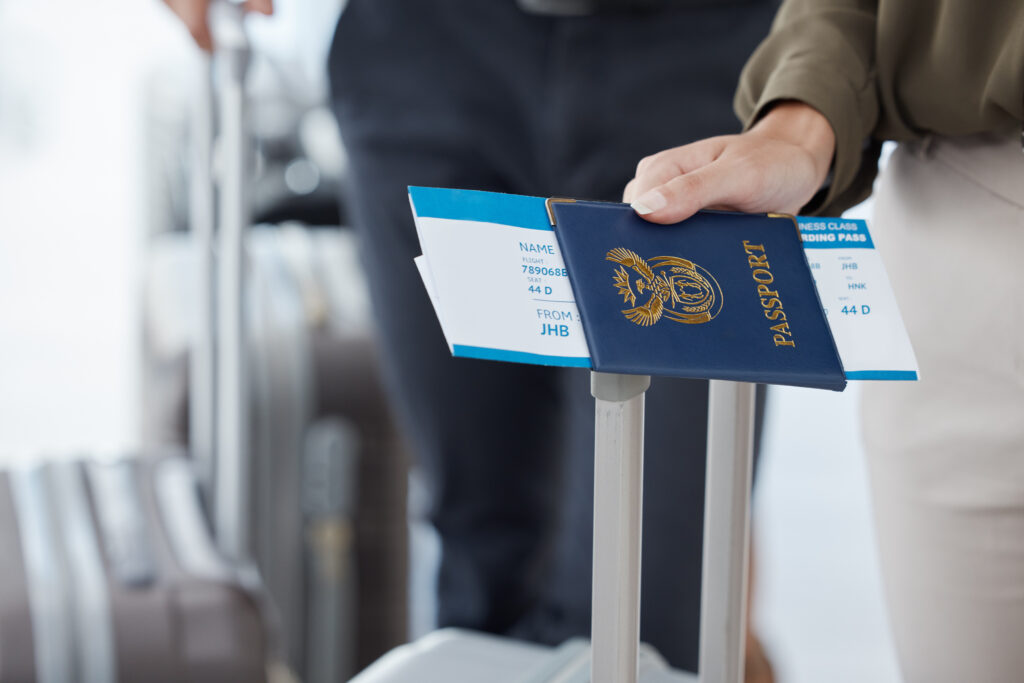Nothing ruins a perfectly good vacation like unexpected stress, throwing a wrench into the excitement of your long-awaited trip to Tenerife. The anticipation builds, the plans are made, and just when you think everything is sorted, bam! Stress rears its ugly head because you realize you weren’t as prepared as you thought. That’s why meticulous preparation is essential. Particularly if you’re going on a holiday abroad and to destinations that require passports. In my book, it’s all about the three Ps. Prepare, prepare, prepare! So, before you go off on your journey to paradise, make sure to thoroughly go through this checklist. And then, for good measure, go through it again. After all, the last thing you want is to realise you’ve packed more stress than sunscreen! So let’s manage that stress before it occurs, shall we?
Your Passport
Forgetting your passport at home, only to realise it when you’re already at the airport, is a universal fear we can all relate to. The sheer panic of that moment is enough to send shivers down anyone’s spine. But let’s say you did remember your passport – did you bother to check if it’s actually valid? It’s surprising how many of us overlook this important detail. Well, while some countries might let you in with a passport that’s just shy of its expiration date, many won’t be as lenient. Yes, you might argue, ‘But my passport hasn’t expired yet!’ True, but that doesn’t necessarily guarantee smooth sailing through immigration, does it?
To avoid any last-minute surprises and potential travel nightmares, I’d absolutely recommend familiarising yourself with your destination country’s passport regulations. For example, ensure your passport is less than 10 years old. And it should have a validity of at least 90 days beyond the expiration date of your visa. And don’t forget about the infamous six-month passport rule enforced by some countries. This always demands that your passport remains valid for an additional six months after you’ve left the country you are visiting. And trust me, the last thing you want is to find yourself stuck at the airport.
Is Your Name Consistent On All Documents?
Now that your passport is all set, let’s talk about something just as important: making sure your name matches on all your travel papers. To avoid any headaches at the airport, it’s super important to use your full, official name consistently. That means leaving any cute nicknames/pet names behind! Using different versions of your name, like ‘Liz’ instead of Elizabeth, will cause confusion. Therefore if you keep everything the same on all your documents, you’ll make your trip much smoother and way less stressful. So stick with your official name and you’ll be good to go!
Immigration Documentation

Image:Wesley JvR/peopleimages.com / Adobe Stock
By now, you know that if you are going on a holiday abroad, you’ll need your passport to prove to the immigration officers that you’re, indeed the person on the ticket arriving. In some cases, border officers may ask for extra documentation. So, to avoid being the person who annoyingly holds up the immigration line, I highly recommend having all your documents organised neatly in one special folder, beforehand.
Imagine the frustration of fellow travellers if you’re rummaging through your bag, searching for paperwork, while they’re waiting behind you. I mean, we’re all tired and stressed after a long flight, and nobody wants unnecessary delays.
So gather all the necessary documents, including proof of accommodation, travel insurance details, and a return or onward ticket. Don’t forget to check if your destination country has any specific requirements. For example, proof of where you intend to stay or your address if you’re staying with friends or family. As usual in this case, a little preparation goes a long way in ensuring a stress-free trip through immigration checkpoints.
Are You Vaccinated?
Before you pack your bags to travel abroad, it’s always a good idea to think about getting extra vaccinations to protect yourself from illnesses common in other parts of the world. If you’re not sure, ask your doctor or a travel clinic. Ask them which vaccinations you need for where you’re going. Make sure you’re vaccinated against diseases like yellow fever or malaria, especially if you’re visiting places where these diseases are common. This is important because some immigration desks might ask you to provide proof of vaccination before they can allow you to enter their country. Without one, you may be required to quarantine for up to 7 days to make sure you are not infected. So to avoid this inconvenience, be sure to check the requirements early. Then schedule appointments with your doctor to get vaccinated before your anticipated trip!
Know what you can or can’t bring into that Country
A lot of people tend to forget that bringing forbidden items into a country can lead to hefty fines. For example, even something as innocent as a single apple forgotten to be declared can result in hundreds of dollars in penalties. So, it’s really essential that you understand the food regulations of the country you’re visiting. Some places have strict rules about what food you can bring and only allow commercially packed items to be brought in. And many countries also enforce stringent regulations on bringing in fruits, vegetables, meat, dairy, and other farm products. They do this to prevent pests, diseases, and harmful species from entering and to protect their farms and ecosystems. To avoid issues like these at customs, take the time to research these regulations and plan your meals and snacks accordingly. And remember, this is not a joke. Spend a bit of time watching the ‘Border Patrol series’ that will show you how serious these rules can be!
Know Details Of Your Destination
I would strongly advise investing some time to thoroughly research your holiday destination way before embarking on your trip. Then create an itinerary that aligns with your interests and allows you to fully experience the location. Also keep in mind that upon arrival, Immigration officers may also inquire about your plans and reasons for visiting the country. So being well-informed about your destination not only shows preparedness and respect for the local culture but also will help you maximise your time as a visitor.

Know How Much Money You Are Required To Have
Are you aware of how much money you’ll need for your trip? Take the time to estimate your expenses for the duration of your journey and make sure you have sufficient funds to cover your entire stay. Keep in mind that some countries may require travellers to demonstrate proof of financial means, such as a specific amount per day per person. So, before you jet off, do your homework on your destination’s financial expectations to dodge any wallet-related woes at the border. And hey, who knows, maybe you’ll even have enough left over for an extra souvenir or two—just in case you’re tempted by that quirky fridge magnet collection!
Always Know What Is In Your Luggage
I cannot stress this enough. Always pack your own bags. Always pack your own bags when travelling abroad to avoid any trouble at the airport. By packing yourself, you ensure you’re not carrying anything illegal or dangerous or falling victim to scams. Knowing what’s in your luggage will give you peace of mind during your trip, allowing you to travel confidently through airport security checkpoints. Think I’m exaggerating? Try watching “Nothing To Declare” and see the consequences of not packing your own bags. Overall, taking control of your packing helps ensure a safe and hassle-free travel experience. And if someone else has to help you pack, then make sure you carefully inspect everything afterwards.
Bon Voyage!



